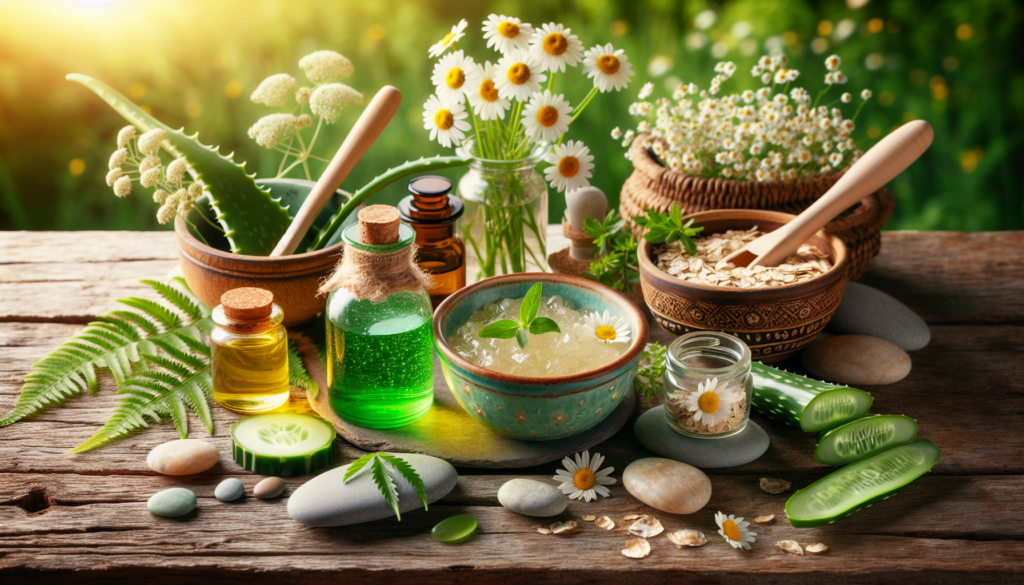Here are 5 natural remedies for Rosacea you may be interested in knowing. If you’re one of the many individuals seeking relief from the discomfort and frustration of rosacea, look no further. In this article, you’ll discover five excellent natural remedies to help soothe your skin and alleviate rosacea symptoms. From incorporating specific foods into your diet to trying out soothing natural skin treatments, these solutions are easily accessible and can make a real difference in managing your condition. Say goodbye to redness and irritation, and embrace a more comfortable and confident you.
Let’s Explore The 5 Natural Remedies for Rosacea:
Topical Remedies
Aloe Vera
One of the most popular natural remedies for rosacea is aloe vera. Known for its soothing and healing properties, aloe vera gel can help calm inflammation and redness associated with rosacea. You can apply a small amount of pure aloe vera gel directly onto the affected areas of your skin. Not only does it provide immediate relief, but it also moisturizes your skin, making it feel refreshed and hydrated.
Green Tea
Green tea is not only a delicious beverage but also an effective topical remedy for rosacea. Packed with antioxidants, green tea can help reduce inflammation and redness. To use green tea as a topical treatment, brew a cup of green tea and let it cool. Then, dip a cotton ball or a clean cloth into the tea and gently apply it to the affected areas of your skin. Alternatively, you can also freeze the brewed green tea into ice cubes and use them as a soothing cold compress.
Honey
Honey is another natural ingredient that can provide relief for rosacea symptoms. Its antibacterial and anti-inflammatory properties can help calm irritation and promote healing. You can apply a thin layer of raw honey onto your skin and leave it on for about 20 minutes before rinsing it off with lukewarm water. Regular use of honey as a topical treatment can help improve the overall appearance of your skin and reduce redness.
Chamomile
Chamomile is well-known for its calming and soothing properties. When applied topically, chamomile can help reduce inflammation and redness associated with rosacea. You can make a chamomile tea by steeping chamomile flowers in hot water for 5-10 minutes. Once the tea has cooled down, you can use it as a facial toner or apply it directly onto the affected areas using a cotton ball. Chamomile can also be used as an ingredient in homemade face masks or creams for added benefits.
Licorice Extract
Licorice extract has been used in traditional medicine for centuries due to its anti-inflammatory properties. When applied topically, licorice extract can help calm redness and irritation caused by rosacea. You can find licorice extract in skincare products specifically formulated for rosacea or make a DIY face mask using licorice powder mixed with a carrier oil, such as coconut oil or jojoba oil. Apply the mixture onto your skin and leave it on for 15-20 minutes before rinsing it off with warm water.
Dietary Changes
Anti-Inflammatory Diet
Making dietary changes can also help manage rosacea symptoms. Following an anti-inflammatory diet can help reduce inflammation in the body, which can, in turn, alleviate rosacea flare-ups. Incorporate fresh fruits and vegetables, whole grains, lean proteins, and healthy fats into your diet. Additionally, avoid or limit processed foods, sugary snacks, alcohol, and spicy foods, as they can trigger rosacea symptoms for some individuals.
Probiotics
Probiotics can play a significant role in improving gut health, which is closely linked to rosacea. Consuming foods or taking supplements that are rich in probiotics can help balance the bacteria in your gut and reduce inflammation. Look for probiotic-rich foods like yogurt, kefir, sauerkraut, and kimchi. If you prefer a supplement, consult with your healthcare provider for the appropriate dosage and strain.
Omega-3 Fatty Acids
Omega-3 fatty acids have anti-inflammatory properties that can benefit individuals with rosacea. You can incorporate omega-3 fatty acids into your diet by consuming fatty fish such as salmon, mackerel, and sardines. If you follow a vegetarian or vegan diet, you can opt for plant-based sources of omega-3s such as chia seeds, flaxseeds, and walnuts. Alternatively, you can consider taking fish oil or algae oil supplements after consulting with your healthcare provider.

Stress Management
Deep Breathing
Stress and anxiety are common triggers for rosacea flare-ups. Engaging in deep breathing exercises can help reduce stress levels and promote relaxation. Find a quiet space, sit comfortably, and take slow, deep breaths. Inhale deeply through your nose, hold your breath for a few seconds, and exhale slowly through your mouth. Repeat this process several times, focusing on your breath and allowing your body to relax.
Meditation
Practicing meditation regularly can have a positive impact on both your mental well-being and your skin health. Whether it’s mindfulness meditation, guided imagery, or mantra meditation, find a meditation technique that suits you and incorporate it into your daily routine. Taking a few minutes each day to calm your mind and focus on the present moment can help reduce stress and improve overall emotional well-being.
Exercise
Regular exercise is not only beneficial for your overall health but can also help manage your rosacea symptoms. Engaging in moderate-intensity exercises like walking, swimming, or cycling can increase blood flow and promote healthy circulation. However, it’s important to avoid activities that may trigger excessive sweating, as it can potentially worsen your rosacea symptoms. Always listen to your body and choose activities that make you feel comfortable and relaxed.
Natural Skincare Routine
Gentle Cleansers
Choosing the right cleanser is crucial for individuals with rosacea. Look for gentle, fragrance-free cleansers that are specifically formulated for sensitive skin. Avoid harsh ingredients like alcohol, fragrance, and sulfates, as they can further irritate your skin. Opt for mild cleansers that can effectively remove dirt and impurities without stripping away your skin’s natural oils.
Moisturizers
Moisturizing your skin is essential for maintaining its health and reducing rosacea symptoms. Look for moisturizers that are non-comedogenic, meaning they won’t clog your pores. Choose products that contain soothing ingredients like aloe vera, chamomile, or hyaluronic acid. Applying moisturizer regularly can help hydrate your skin and create a protective barrier against external irritants.
Sunscreen
Sun exposure can trigger rosacea flare-ups, so it’s important to protect your skin from harmful UV rays. Use a broad-spectrum sunscreen with an SPF of 30 or higher and apply it generously to all exposed areas of your skin. Look for sunscreens that are specifically formulated for sensitive skin and are free of irritating chemicals like oxybenzone and fragrance.
Avoid Harsh Ingredients
When it comes to skincare products, it’s crucial to avoid harsh ingredients that can aggravate your rosacea symptoms. Stay away from products that contain alcohol, fragrance, menthol, or harsh exfoliants. These ingredients can strip your skin’s natural oils and cause further irritation. Instead, choose gentle and fragrance-free skincare products that are specifically formulated for sensitive skin.
Cold Compress
If you experience a flare-up or intense redness, a cold compress can provide immediate relief. Take a clean, soft cloth and dampen it with cold water. Gently press the cold compress onto the affected areas of your skin for a few minutes. The cold temperature can help constrict blood vessels and reduce inflammation, effectively soothing your rosacea symptoms.

Herbal Supplements
Turmeric
Turmeric is a powerful herb that possesses anti-inflammatory properties. Consuming turmeric or taking turmeric supplements can help reduce inflammation and alleviate rosacea symptoms. However, it’s important to consult with your healthcare provider before incorporating turmeric into your diet or taking supplements, as it may interact with certain medications or have adverse effects in excessive amounts.
Sulfur
Sulfur has been used for centuries in traditional medicine for various skin conditions, including rosacea. It has antimicrobial and anti-inflammatory properties that can help calm redness and inflammation. Sulfur can be found in topical creams, ointments, or facial masks specifically formulated for rosacea. However, it’s important to use sulfur products as directed and avoid overuse, as it can potentially cause dryness or irritation.
Vitamin C
Vitamin C is an antioxidant that can help protect your skin from oxidative stress and reduce inflammation. Consuming foods rich in vitamin C, such as citrus fruits, strawberries, bell peppers, and broccoli, can provide you with the benefits of this essential nutrient. Additionally, applying topical vitamin C serums or creams directly onto your skin can help promote a healthy complexion and minimize rosacea symptoms.
Milk Thistle
Milk thistle is an herbal supplement that has been traditionally used to support liver health. Some studies suggest that individuals with rosacea may have underlying liver dysfunction, and supporting liver health can potentially alleviate symptoms. However, more research is needed to fully understand the connection between milk thistle and rosacea. If you’re considering taking milk thistle, consult with your healthcare provider to determine the appropriate dosage and potential risks.
Evening Primrose Oil
Evening primrose oil is derived from the seeds of the evening primrose plant and is rich in essential fatty acids. It has been used as a natural remedy for various skin conditions, including rosacea. Evening primrose oil can be taken orally as a supplement or applied topically as a facial oil. It may help reduce inflammation and improve overall skin health, but it’s important to consult with your healthcare provider before adding it to your skincare routine.



